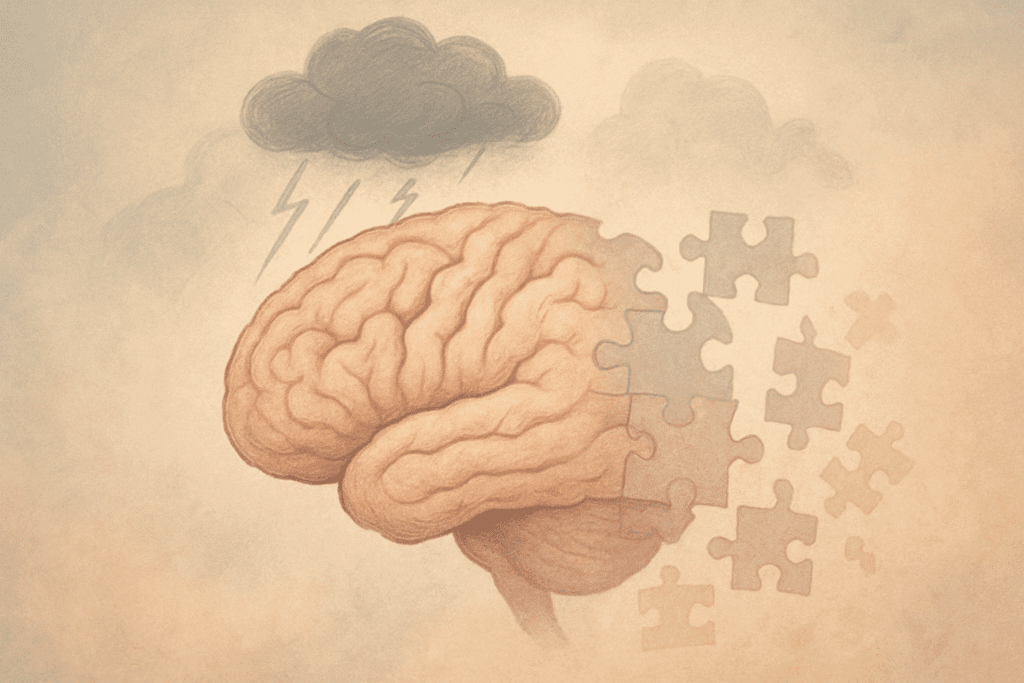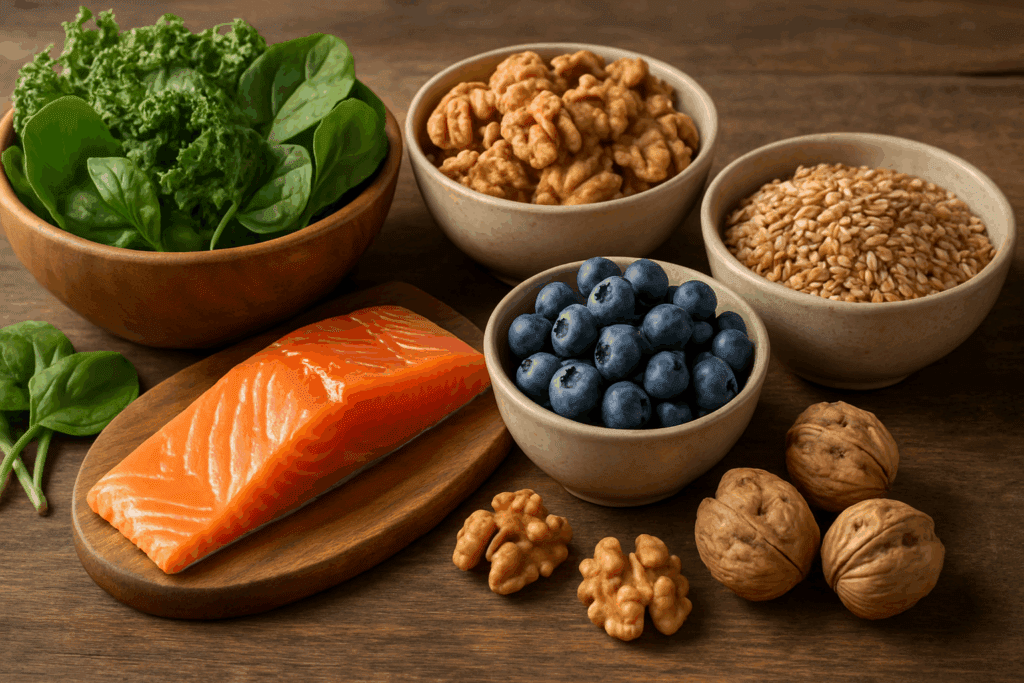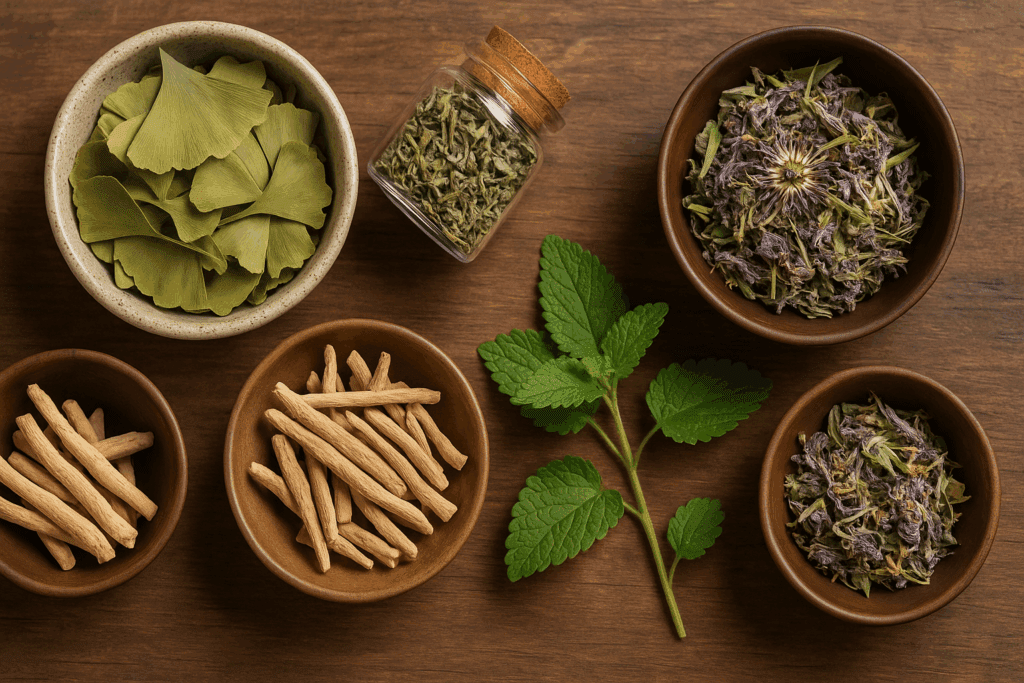In the tapestry of aging, memory and mood form threads that are both delicate and essential. As adults transition into the later stages of life, the risk of cognitive decline and emotional disturbances such as anxiety becomes more pronounced. For many families, watching a loved one forget cherished memories or grow increasingly anxious can be a painful experience. This article explores the intricate relationship between anxiety and memory loss in elderly adults, seeking to answer a critical question: can natural foods and herbs help support brain health?
You may also like: Best Herb for ADHD Support: How Natural Remedies and Herbs for ADHD Women May Help Boost Focus and Calm
Understanding the Link Between Anxiety and Memory Loss in Elderly Adults
It is not uncommon for elderly individuals to experience anxiety alongside memory loss, but the connection between the two is more than just coincidental. Emerging research reveals that chronic stress and anxiety can significantly impair cognitive functions, particularly in older adults. The hippocampus, a brain region responsible for memory consolidation, is especially vulnerable to prolonged stress. Cortisol, the stress hormone, can damage this area over time, leading to difficulties in forming new memories and retrieving old ones.
Anxiety in elderly adults can stem from a variety of sources—retirement, loss of a spouse, reduced mobility, or the onset of health problems. When compounded by memory issues, it creates a feedback loop that heightens distress and accelerates cognitive decline. Understanding how these two conditions interact is essential to developing strategies that not only manage symptoms but also promote long-term brain health.
Moreover, there’s a pressing need to address common concerns voiced by many caregivers and individuals alike: does stress make you forgetful, or can stress make you forget things you once knew so well? The answer lies in the physiological and psychological interplay between anxiety and memory processing. Chronic stress not only interferes with encoding new information but also impairs the brain’s ability to retrieve it effectively.

How Aging Affects the Brain and Memory
Normal aging brings about structural and functional changes in the brain, but not all of these changes signify pathology. A mild decrease in processing speed, slower retrieval of information, and momentary forgetfulness—such as forgetting where one placed their keys—can be typical of aging. However, when memory loss becomes persistent and interferes with daily functioning, it raises red flags for conditions like mild cognitive impairment (MCI) or dementia.
One must differentiate between normal age-related forgetfulness and the more serious memory impairments that accompany neurodegenerative diseases. The elderly population is particularly susceptible to Alzheimer’s disease, a condition marked by progressive memory loss, language problems, and disorientation. Yet, anxiety can exacerbate these symptoms, making even minor forgetfulness seem more alarming.
Sleep disturbances, often prevalent in aging populations, further compound the problem. Sleep is essential for memory consolidation, and inadequate rest disrupts this critical function. Natural foods and herbs that support healthy sleep cycles, reduce anxiety, and nourish the brain may therefore play a pivotal role in helping seniors retain mental sharpness and emotional stability.
Can Stress Make You Forget Things? Exploring the Science
The phrase “can stress make you forget things” is often uttered in exasperation, but it is also backed by scientific inquiry. Stress triggers a cascade of hormonal responses that can disrupt the brain’s ability to process and store information. During acute stress, attention narrows, and cognitive flexibility diminishes. Over time, if stress becomes chronic, it alters brain structures involved in memory, notably the prefrontal cortex and hippocampus.
In elderly adults, who may already have a compromised neurobiological foundation due to aging, the impact of stress can be even more pronounced. This explains why anxiety and memory loss in elderly individuals often co-occur. Stress-induced forgetfulness is not limited to the elderly, but its consequences are often more severe in this population.
Research also suggests that stress impairs working memory—the type of memory that allows individuals to hold and manipulate information over short periods. For seniors trying to learn new technology or navigate unfamiliar environments, this kind of memory is crucial. When stress disrupts this function, frustration, and further anxiety often follow.

Foods That Support Cognitive Health in Seniors
Nature offers a bounty of foods that support brain health, many of which have been validated by science for their neuroprotective properties. Fatty fish, such as salmon and sardines, are rich in omega-3 fatty acids, which are essential for maintaining the integrity of brain cell membranes and supporting communication between neurons. Studies have shown that seniors who consume omega-3-rich diets tend to have lower rates of cognitive decline.
Berries—particularly blueberries—contain anthocyanins, powerful antioxidants that reduce inflammation and oxidative stress in the brain. These compounds are believed to enhance signaling in brain centers responsible for memory and learning. Leafy greens like spinach and kale are also beneficial, providing essential nutrients such as folate, vitamin K, and lutein, which collectively support cognitive function.
Whole grains, nuts, and seeds contribute to better cardiovascular health, which in turn ensures adequate blood flow to the brain. A steady supply of oxygen and nutrients is critical for memory retention and overall brain performance. Including these foods in daily meals can be one of the most accessible and effective strategies to support aging brains.
Herbs for Brain Health: Natural Allies Against Anxiety and Forgetfulness
Alongside a brain-healthy diet, certain herbs have been traditionally used to alleviate anxiety and bolster memory. Ashwagandha, a cornerstone of Ayurvedic medicine, is known for its adaptogenic properties—it helps the body manage stress more effectively and lowers cortisol levels. This can be particularly beneficial for elderly individuals whose memory impairments are exacerbated by chronic anxiety.
Ginkgo biloba is perhaps the most well-known herb for memory enhancement. It improves blood circulation to the brain and is thought to protect neurons from damage caused by free radicals. Several clinical trials suggest that ginkgo may help slow the progression of dementia and improve attention span and memory in older adults.
Bacopa monnieri, another herb rooted in Ayurvedic practice, has shown promise in enhancing cognitive performance, particularly in memory formation and recall. Studies have found that bacopa supplements can improve memory retention, which is essential for seniors who struggle to remember appointments, names, or important tasks.
Lemon balm and passionflower are two calming herbs that may reduce anxiety and promote better sleep—both of which are vital for memory consolidation. These herbs offer gentle sedative effects that can make them suitable for use in elderly populations without the side effects commonly associated with pharmaceutical anxiolytics.

Lifestyle Practices That Reinforce Memory and Mood
While diet and herbs provide foundational support, lifestyle practices play an equally important role in preserving memory and reducing anxiety. Physical exercise, particularly aerobic activity, has been shown to stimulate neurogenesis—the growth of new neurons—in the hippocampus. Even modest daily walks can improve mood and cognitive function in elderly adults.
Mental stimulation is another critical factor. Activities such as reading, learning a new language, or engaging in memory games can help keep the brain agile. For those wondering how to memorize things fast for a test or how to memorize something in 10 minutes, it’s worth noting that regular cognitive engagement helps establish new neural pathways, which can compensate for age-related losses.
Mindfulness practices, such as meditation and deep breathing, reduce stress and improve focus. These techniques are invaluable tools in any regimen aimed at combating anxiety and memory loss in elderly adults. Over time, mindfulness can also help manage emotional responses to forgetfulness, reducing the fear and frustration that often accompany memory lapses.

Understanding the Mechanism: How to Remember What You Read for Exams and Daily Life
Seniors returning to learning or those involved in cognitively demanding hobbies often ask how to remember what you read for exams or how to remember information for a test. The key lies in active recall and spaced repetition—two evidence-based techniques that enhance memory retention.
Active recall involves testing oneself on the material rather than passively rereading it. Spaced repetition leverages the psychological spacing effect, where information is reviewed at increasing intervals to reinforce memory. These techniques form the basis of many good study techniques for memorization and are equally applicable to elderly individuals seeking to retain critical information such as medication schedules or emergency contacts.
Another useful method is the use of visual aids and associations. Creating vivid mental images or linking new information to familiar concepts can make it easier to memorize things fast for a test or retain names and dates. These memory methods for studying are not limited to students; they serve elderly learners just as effectively.
The Role of Routine and Environment in Memory and Emotional Health
The environment in which an elderly person lives significantly influences their cognitive and emotional well-being. A calm, organized, and familiar environment reduces cognitive load, making it easier to remember daily tasks. Disorganized or overstimulating surroundings can increase stress, thus exacerbating memory issues.
Consistent daily routines can help structure the day in a way that promotes mental clarity and reduces anxiety. For instance, establishing a regular sleep schedule supports circadian rhythms, which in turn enhances sleep quality and memory consolidation. Including memory-supportive rituals—such as journaling, listening to classical music, or practicing gratitude—can reinforce mental and emotional resilience.
Social interaction is another pillar of brain health. Engaging in meaningful conversations, participating in group activities, or volunteering in the community fosters a sense of purpose and combats loneliness. These interactions not only lift mood but also serve as cognitive exercises that sharpen memory and attention.
Natural Interventions for Memory: What to Eat, How to Live, and How to Remember Things Fast
Natural interventions extend beyond specific foods and herbs; they encompass an integrated approach that involves eating well, sleeping sufficiently, exercising regularly, and engaging mentally. When seniors ask how to remember things while studying or how to memorize something overnight, the answer lies in preparation and consistency. Last-minute cramming rarely works, particularly for aging brains. Instead, sustained, gentle reinforcement of information is key.
For memory to flourish, the nervous system must be nourished on every level—from biochemical support to emotional regulation. Foods rich in magnesium, zinc, and B vitamins help maintain neurotransmitter balance. Similarly, herbs like Rhodiola and Gotu Kola support mental endurance and cerebral circulation, contributing to long-term memory enhancement.
When selecting dietary supplements or herbal preparations, it is essential to consult healthcare providers, especially if other medications are in use. Interactions can occur, and some natural remedies may not be appropriate for every individual. A personalized approach ensures safety and effectiveness.

FAQ: Anxiety and Memory Loss in Elderly Adults – Natural Remedies, Cognitive Support, and the Role of Stress
1. How does stress specifically impact long-term memory in elderly adults?
Chronic stress, particularly when it persists over time, alters brain function at the structural level. In elderly individuals, stress often affects the hippocampus—a key brain region involved in long-term memory storage. When cortisol, the stress hormone, remains elevated for prolonged periods, it can inhibit the growth of new neural connections and even shrink parts of the hippocampus. This explains why many caregivers and seniors alike ask, “does stress make you forgetful?” The answer is a resounding yes, particularly when stress becomes chronic. In elderly adults, this phenomenon intensifies due to natural age-related cognitive changes, exacerbating forgetfulness and reducing the brain’s resilience.
2. Why is it harder for elderly adults to bounce back from stress-related memory lapses?
Aging naturally slows down the brain’s neuroplasticity—the ability to adapt and rewire. In younger individuals, the brain often recovers more quickly from stress-induced cognitive disruptions. However, in older adults, this process becomes sluggish, which is why they might experience longer-lasting forgetfulness following stressful events. So, when asking, “can stress make you forget things permanently?”, it’s important to recognize that although memory may return, recovery can be significantly delayed in seniors. This vulnerability underscores the importance of early stress management strategies in older populations.
3. Are social stressors as impactful as physical stress in triggering memory problems?
Absolutely. Emotional and social stress—such as isolation, bereavement, or financial insecurity—can trigger the same biological stress responses as physical stress. For elderly individuals, who often experience more life transitions and loss, these psychosocial triggers can quietly but powerfully impact cognition. The question “does stress make you forgetful even if you’re not physically overwhelmed?” is therefore crucial. The answer is yes—emotional distress can silently erode memory capabilities over time, especially when left unaddressed. Supporting seniors socially is as important as supporting them nutritionally or physically.
4. What are some unconventional but effective natural interventions for stress-related memory loss?
While common remedies like ginkgo biloba and omega-3s are well-documented, lesser-known interventions can also be surprisingly effective. For example, aromatherapy using essential oils such as rosemary or lavender has shown promise in calming anxiety and enhancing memory recall. Forest bathing—or spending mindful time in green environments—has been linked to reductions in cortisol levels and improvements in mental clarity. In cases of anxiety and memory loss in elderly individuals, incorporating sensory-based therapies can offer profound and practical relief. These options work not only to ease stress but also to create calming routines that reinforce memory.
5. Can stress-induced forgetfulness be mistaken for early dementia?
Yes, and this is a growing concern among clinicians and families alike. When elderly individuals forget names, appointments, or directions, caregivers may fear the onset of dementia. However, in many cases, these symptoms are temporary and tied to emotional overload. When wondering “can stress make you forget things like a medical condition might?”, the answer is that stress can indeed mimic cognitive disorders in presentation. The key distinction lies in the reversibility of symptoms—once stress is reduced, memory often improves, unlike the progressive decline seen in neurodegenerative diseases.
6. How can family members help elderly loved ones reduce memory-related anxiety?
Empathy and consistency go a long way. Family members can support seniors by creating predictable daily routines, offering gentle reminders without judgment, and encouraging social interaction. Stress-reducing activities like shared walks, music therapy, or even simple games can provide emotional comfort while also stimulating the mind. Asking “does stress make you forgetful in family dynamics?” opens up important conversations about how intergenerational stress can affect memory. When families model calmness and support, they create an emotional buffer that helps reduce memory-related anxiety in seniors.
7. What role does sleep quality play in anxiety and memory loss in elderly adults?
Sleep is a foundational component of brain health, especially for the elderly. Poor sleep increases cortisol levels and impairs the brain’s ability to consolidate memories. Unfortunately, many seniors suffer from disrupted sleep due to pain, medications, or underlying anxiety. Questions like “does stress make you forgetful after a sleepless night?” highlight how interconnected these factors are. Improving sleep hygiene—through herbal teas like chamomile, reduced screen time, or cognitive behavioral therapy—can significantly enhance both memory and emotional stability in older adults.
8. Can mindfulness-based techniques truly improve memory in the elderly?
Yes, and their effects can be profound. Mindfulness practices such as meditation, slow breathing, or body scanning help calm the nervous system, reducing stress hormones that interfere with cognitive processing. For elderly individuals struggling with anxiety and memory loss, these practices serve a dual function: improving emotional regulation while strengthening mental focus. In exploring whether “can stress make you forget things you just learned,” it’s helpful to understand that mindfulness builds a mental pause, allowing new information to settle and be retained more effectively.
9. Are there future therapies on the horizon for managing anxiety and memory loss in elderly adults?
Emerging research into neurofeedback and personalized nutrition is offering exciting possibilities. Neurofeedback trains the brain to self-regulate emotional responses, potentially lowering stress-induced memory disruptions. Likewise, tailored diets based on genetic and microbiome data are beginning to show promise in enhancing both mood and memory. These innovations are particularly valuable in addressing anxiety and memory loss in elderly individuals who may not respond well to traditional pharmaceutical options. The hope is that future interventions will become more holistic, integrating physical, emotional, and even digital support systems.
10. Is it ever too late to reverse stress-related memory decline?
While some age-related memory decline is natural, many cognitive functions remain flexible well into old age—especially when the root cause is stress. Neuroplasticity may slow, but it does not vanish entirely. With the right interventions—whether natural, therapeutic, or lifestyle-based—many seniors can experience real cognitive improvement. Asking “does stress make you forgetful forever?” or “can stress make you forget things permanently?” often stems from fear, but the reality is far more hopeful. Timely support, nutritional adjustments, and emotional care can lead to meaningful recovery, reinforcing that it’s never too late to rebuild memory health.

Conclusion: Embracing Holistic Support for Anxiety and Memory Loss in the Elderly
The intersection of anxiety and memory loss in elderly adults is a complex and multifaceted issue, but it is not insurmountable. By addressing both emotional and cognitive health through natural foods, herbs, and evidence-based lifestyle strategies, seniors can experience meaningful improvements in quality of life.
It is clear that chronic stress can make you forget things, and that anxiety plays a significant role in cognitive decline. However, with the right support—nutritional, botanical, psychological, and social—these effects can be mitigated. Foods like fatty fish, leafy greens, and berries; herbs like ginkgo, ashwagandha, and bacopa; and memory-enhancing techniques such as spaced repetition and active recall form a powerful alliance against forgetfulness and fear.
Ultimately, the goal is not just to remember things while studying or to memorize something fast for a test, but to build a life rich in mental clarity, emotional balance, and purposeful living. Aging need not be accompanied by inevitable decline. With mindful interventions and compassionate care, elderly adults can retain not just their memories, but also their joy, dignity, and independence.
Further Reading:
Memory loss: When to seek help


